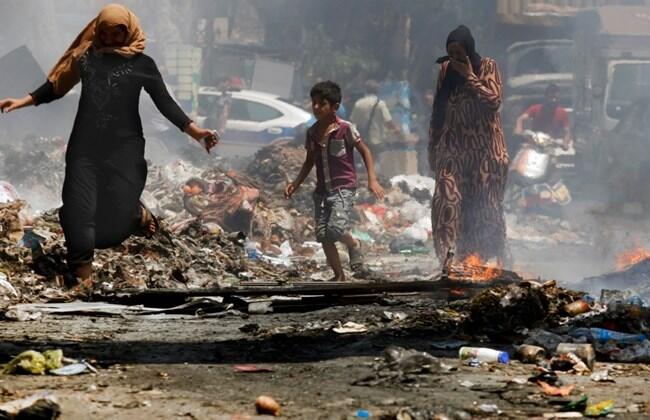The overflowing dumpsters are an eyesore, and the summer heat has exacerbated their noxious odor. In the face of government inaction, what can be done at an individual level to mitigate the problem? One campaign is advocating sorting waste at the source. The Naameh landfill was closed on July 17 without the selection of a replacement site. With no designated repository, garbage has piled up in the streets of Beirut and Mount Lebanon for a week. Sobhiya Najjar and Ziad Abi Chaker, founders of “Sar Lezem Rassak Yifrouz” campaign, said that citizens should start taking responsibility of their waste by sorting their trash into different colored plastic bags. “We looked at what bags are present at the supermarket,” Najjar, an environmental activist, told The Daily Star. “We found that the most used bags are blue and black.” “In the blue bag we put plastic, cans, and metal … everything that’s not food. In the black bag, we put food, cardboard, papers and tissue.” The blue bag can also be used for water and shampoo bottles, detergent bottles, chip bags, glass and batteries, according to one of the campaign’s posters. The black bag can take organic materials such as food waste, tissues, magazines, newspapers and small cardboard boxes. Putting paper in with food can help absorb its water, so that when it rots, the waste is not as smelly. There is very little hassle involved, Najjar said, as people can continue to drop off their trash in the same locations. Abi Chaker is the CEO of Cedar Environmental, which specializes in constructing municipal recycling centers. He is working with organizations interested in the initiative to provide bins constructed of environmentally friendly Eco-Board for depositing the sorted trash. “We said that we want to reduce waste, but we don’t have the solution, we have part of the solution.” But the scheme relies on those who forage through trash looking for saleable material. Sorting the garbage beforehand could help them directly identify bags whose contents could be sold on to recycling yards, according to the campaign. This would lead to fewer bags of trash flowing from dumpsters, and could increase the proportion of waste that gets recycled. The campaign proposes that a proper recycling program should be the long-term goal, but that sorting waste is an immediate step that can be taken to help. “In this way, we would be creating jobs for these people. They would be working in an organized way and it won’t make the streets dirty,” Najjar said. “Everyone thinks that there are no recycling factories in Lebanon, but there are.” They haven’t identified a solution for the waste in the black bags, but Najjar had a suggestion. “Those who have gardens can benefit from the organic material by making compost from it.” Najjar was critical of the government’s lack of vision and poor crisis management, and contended that it must have known it was only a matter of time before the country had to confront its garbage problem. In fact, the “Sar Lezem Rassak Yifrouz” campaign isn’t new, it was launched in January when the Cabinet decided to postpone the closure of the Naameh landfill. Work is in progress to make the Badaro area a model of sorting at the source, and a number of organizations there have taken and interest in the project. “The only available solution right now is for all of us to be responsible, because all citizens are being affected,” Najjar said. The Daily Star











